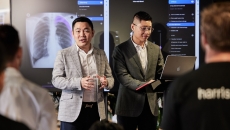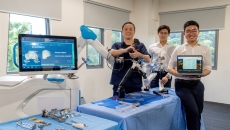AI
Researchers claim their invention offers a cost-effective and faster way to do single-cell analysis.
Avid Health cofounders Tom Allen and Laura Tan discuss the company's proactive health platform that promotes proactive healthcare with comprehensive programs for early intervention, coaching, and content and data insights.
The company has received 12 US FDA approvals.
Working with world-class partners, ensuring AI is safe for patients, educating clinicians, integrating and scaling AI rapidly, is what it takes for a provider to integrate an AI platform, says Dr. Barry Stein, Hartford HealthCare's CCIO.
HIMSS25
At HIMSS25, Matt Cybulsky, healthcare AI and product innovation lead at LBMC, says he hopes to spark interest, curiosity and realistic expectations on technology use in healthcare and AI’s effectiveness in real-world clinical settings.
Daniel Kraft, physician-scientist and founder of NextMed Health and Digital.Health, joined MobiHealthNews to discuss the evolution of AI in medicine and the future of medtech.
The Orthopaedic Surgery team has recently received an international patent for the novel AI for robotic total knee replacement.
The bill would allow AI to be classified as a "practitioner licensed by law" to administer FDA-approved drugs.
The Australian-led project developed these maps, claimed to be the most detailed ever made, to link retinal thinning to various diseases.








